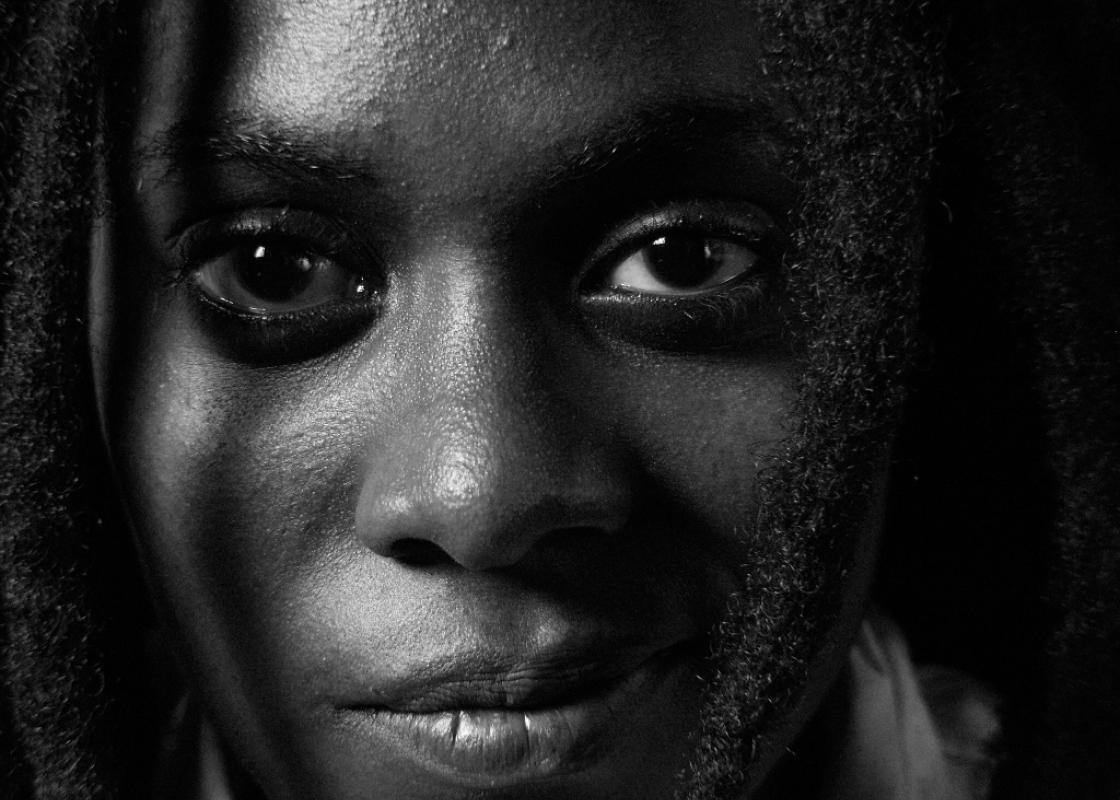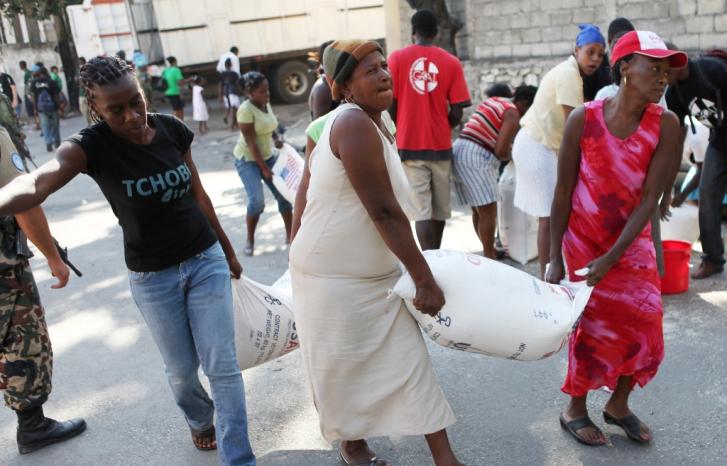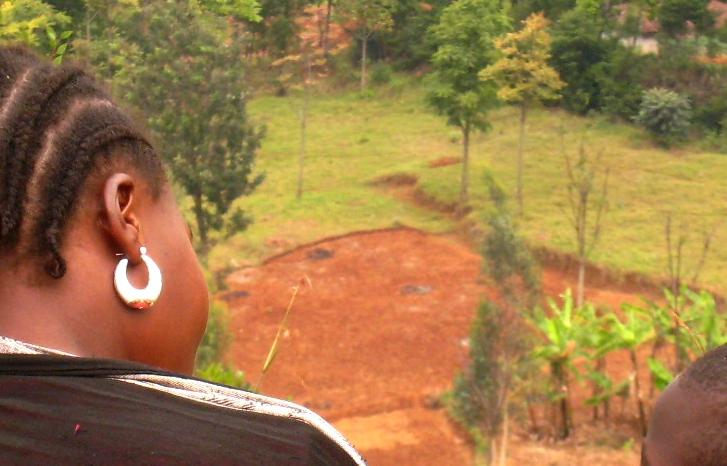A Google search for ‘child soldier’ generates results with hundreds of photographs of primarily African boys carrying machine guns. There are not as many pictures of girl soldiers, despite the fact that they make up approximately thirty-five per cent of the child soldiers in several African armed forces over the past twenty years, according to Child Soldier International.
A defined search for ‘girl soldier’ gives more results, however. Like the boy soldiers, many of them carry weapons and wear military uniforms. But they are wearing considerably less clothes than the boys. A deep dive into the cyber world’s presentation of female soldiers gives us reason to believe that girl soldiers are not only dangerous, they are also promiscuous.
“Such pictures reflect how many people regard girl soldiers both in African societies and internationally,” says Milfrid Tonheim.
Girl soldiers as ‘damaged goods’
In her PhD thesis, she demonstrates how former girl soldiers in East Congo are exposed to extensive stigmatising when they return home to their local communities. This makes it difficult for the girls to return to society and establish a new life after their soldier existence.
“Former girl soldiers are perceived as violent, thieving, promiscuous and as carriers of dangerous and infectious diseases,” says Tonheim.

“They are believed to have a military mentality and behaviour. Many fear that they will have a negative effect on other young people with their conduct, particularly on other girls and young women.”
Former boy soldiers also experience stigmatising. Yet the stigmatisation of girls is more extensive and more sexualised, according to Tonheim.
This can be partly explained by the fact that they, as soldiers, break with expectations related to their role as women. As soldiers, the girls have taken part in a male dominated and masculine culture, and thus crossed the boundary for what is considered decent for a woman.
“Furthermore, many of the girl soldiers return to society as mothers , which increases the likelihood of being rejected by their family and their community. The children clearly prove that the girl is no longer a virgin, something that turns them into ‘damaged goods’.”
Accordingly, they become less attractive as future wives and the bridal prices fall, says Tonheim, adding that in East Congo it is publicly known that girl soldiers are victims of sexual abuse. The fact that the girl soldiers are associated with something sexual is crucial for their stigmatisation.
“Many people conclude that the girls have enlisted as soldiers because they seek sexual attention. Consequently, they are considered promiscuous by society, and other women fear that they are out to tempt their husbands.”
Need to look at human psychology
Fear is central within Tonheim’s analysis of the communities' stigmatisation of the girls. Cultural characteristics in East Congolese society only partly explain how the returned girl soldiers are received.
“We also have to look at a person’s psychology and what war and conflict do to a society,” says Tonheim.
She says that the former girl soldiers are met with attitudes in their local communities that in many ways conflict with the collectivist culture within Congolese society in which the common good is considered important.
But the girls experience being stigmatised by their families too.
“A collectivist society, characterised by a strong group loyalty, should ideally facilitate better reintegration,” says Tonheim.
“This should particularly be the case within the extended families, which often have close ties and a lot of solidarity towards each other. But the girls experience being stigmatised by their families too.”
There have been continuous violent battles in East Congo since the second war in Congo officially ended in 2003. A large number of the girls who have been members of military groups are victims of sexual abuse.
“Here at home I meet many people who say that they cannot understand how returned child soldiers who have experienced highly traumatic events can be treated in this way. Such treatment is often associated with a strange, barbaric culture.”
But there is reason to claim that the way in which the local community treat the girl soldiers is something any society or people could have done in a similar situation,” says Tonheim.
She reminds us that a society’s values are easily altered in an emergency situation.
“War often generates authoritative values and makes us react to deviant behaviour with more fear. War and violence create fear, and the need to protect ourselves and our loved ones leads to exclusion.”
According to Tonheim, we can draw parallels to how women who had been involved with German soldiers during the occupation of Norway in the Second World War were treated.
“The so-called ‘German whores’ were exposed to extensive stigmatisation, revenge and exclusion. This is partly a result of human psychology and how societies that have been through enormous pressure due to war and occupation tend to react,” says Tonheim.
Across cultures
“Representations of women as ‘sluts’, ‘whores’, or promiscuous do not only apply to girls who have been soldiers, but more generally to women who have been involved with violence and war. The idea is deeply rooted in history, and extends across various cultures,” says Tonheim.
In her thesis, she demonstrates how stereotypical ideas of girl soldiers are reproduced in research, international and western media, as well as in international aid organisations.
“The media and the UN and many other organisations tend to focus on the horror stories. It is emphasised that children are more easily manipulable and that young soldiers are more brutal than adults.”
The argument is that violence generates violence, and that the violence becomes normal over time.
Child soldiers are often referred to as lost cases. This generalisation characterises much of the research on child soldiers, according to Tonheim.
“The argument is that violence generates violence, and that the violence becomes normal over time. Former child soldiers are therefore presumed violent and aggressive even after they have left their military groups.”
Feminist research on the relation between women and war has explained how women are perceived as naturally peaceful, with a ‘vivifying identity’. The male identity, on the other hand, is associated with violence and the taking of lives. That a woman should seek a military life is thus against nature.
In her PhD thesis, Tonheim writes that this idea means that the combination women and war is perceived as a misfit. Female soldiers have often been considered whores or in other ways sexually deviant.
According to her, such stereotypical ideas are also visible in representations of girl soldiers in the media and in international aid organisation campaigns.
“In my thesis, I refer to a study in which interviews had been made with relief workers within a reintegration programme in East Africa. One participant said that former girl soldiers had a large sexual appetite. We know little about whether such attitudes are common among people whose job it is to help these girls,” she says.
The idea that former girl soldiers are more likely to enter into prostitution than other girls has also become more widespread, according to Tonheim. This idea is also prevalent in a lot of research.
“A number of scientific articles argue that unless we, as an international society, don’t take action, it is highly likely that former girl soldiers will end up as prostitutes. The argument is that lack of education or skills that would otherwise help the girls make a living, forces the girls to resort to prostitution in order to survive.”
Myths about girl soldiers
Tonheim says that in one of her articles she made the mistake herself, suggesting that former girl soldiers may feel pressured into prostitution due to the lack of another livelihood.
“When I wrote this, I based my own research on a number of other articles claiming the same. When I later reviewed what kind of data this argument was based on, I realised that there is not sufficient evidence to make this claim.”
There is no evidence to prove that girl soldiers are particularly dangerous and violent either, according to Tonheim. She points to the fact that many of the girl soldiers try to escape, which indicates that they want to get away from their life as soldiers. Other research shows that former child soldiers often do better than expected, which goes against the claim that these children are lost cases.
The findings from Tonheim’s field work point in the same direction.
“In my interviews with former girl soldiers, it appeared that only two out of twelve responded aggressively to the stigmatisation, whereas most of them pull away in order to avoid conflict. All they want is to create a life for themselves and to be accepted within their community,” says Tonheim.
Some girl soldiers join military groups precisely in order to avoid unwanted sexual relations and abuse.
Nor is it the case that a life situation characterised by involuntary sexual relations and abuse necessarily results in a distinctly sexualised existence after their lives as soldiers, according to Tonheim.
“Many associate sex with something painful and traumatic after sexual abuse. Furthermore, it is worth mentioning that some girl soldiers join military groups precisely in order to avoid unwanted sexual relations and abuse.”
According to Tonheim, more research is needed to establish whether former girl soldiers have a higher risk of entering into prostitution compared to other groups of vulnerable girls.
“I would suggest that it is primarily poverty, and the totality of a society exhausted by war, that make women enter into prostitution, not the past as a child soldier,” says Tonheim.
Inhibits reintegration
In 2011, Child Soldier International estimated that less than half of the former child soldiers receive help to reintegrate into society. Tonheim has observed how international aid organisations use stereotypical representations of child soldiers with their best intention in order to draw attention to their case.
“But former child soldiers, both girls and boys, are demonised. This may cause harmful ripple effects and hamper reintegration,” says Tonheim.
According to her, the stigmatisation may as a worst-case scenario be reproduced and strengthened by people and health personnel whose original intention is to help the girls back into society.
“When former child soldiers are considered dangerous and violent, the programmes may become more security oriented than rights oriented,” she states.
“If this becomes the case, the programmes may begin to emphasise how to handle and diminish the former soldier’s threatening behaviour, rather than working towards reciprocal adaptation and reconciliation between the former soldier and her family and community.”
Another consequence of the demonising of the girl soldiers is that the relief workers bring such negative perceptions into their work.
“This creates major barriers between those who are there to help and those in need of help,” says Tonheim.
She poses the question: If the relief workers regard former girl soldiers as dangerous and promiscuous, how will they be able to prevent stigmatising?
It is about time that the international society, and particularly the western world, deals with its own attitudes to girl soldiers and child soldiers more generally, Tonheim emphasises.
“Many people think that the stigmatisation of girl soldiers is connected to an underdeveloped African culture and context. But in reality, we find these attitudes in our part of the world too.”
Translated by Cathinka Dahl Hambro.
See also: The Invidible Child Soldiers
Milfrid Tonheim defended her PhD dissertation entitled A Troublesome Transition: Social Reintegration of Girl Soldiers Returning 'Home' on 12 May 2017 at University of Bergen. Her findings are based on field studies in East Congo from 2010, where Tonheim conducted focus group interviews and individual interviews with seventeen former girl soldiers.
Tonheim currently works as a researcher at Uni Research Rokkan Centre, and has an adjunct position at Department of Health Promotion and Development (HEMIL) at University of Bergen. Based on her research and through the foundation Buddies for Africa, Tonheim has started an education project for children of former girl soldiers and other vulnerable children affected by war in East Congo.



